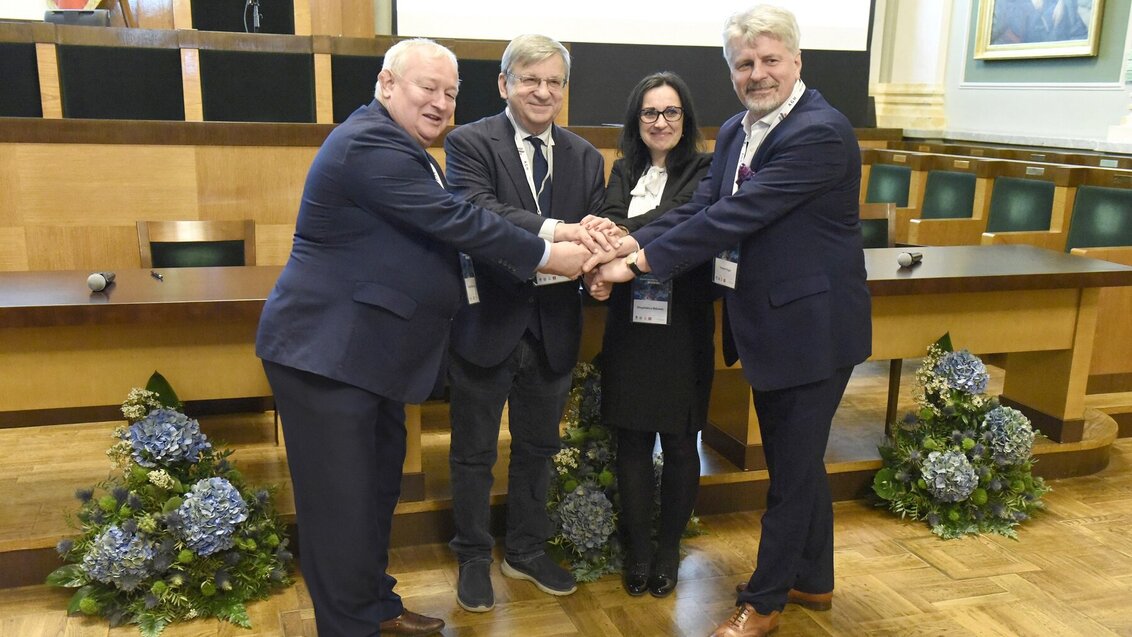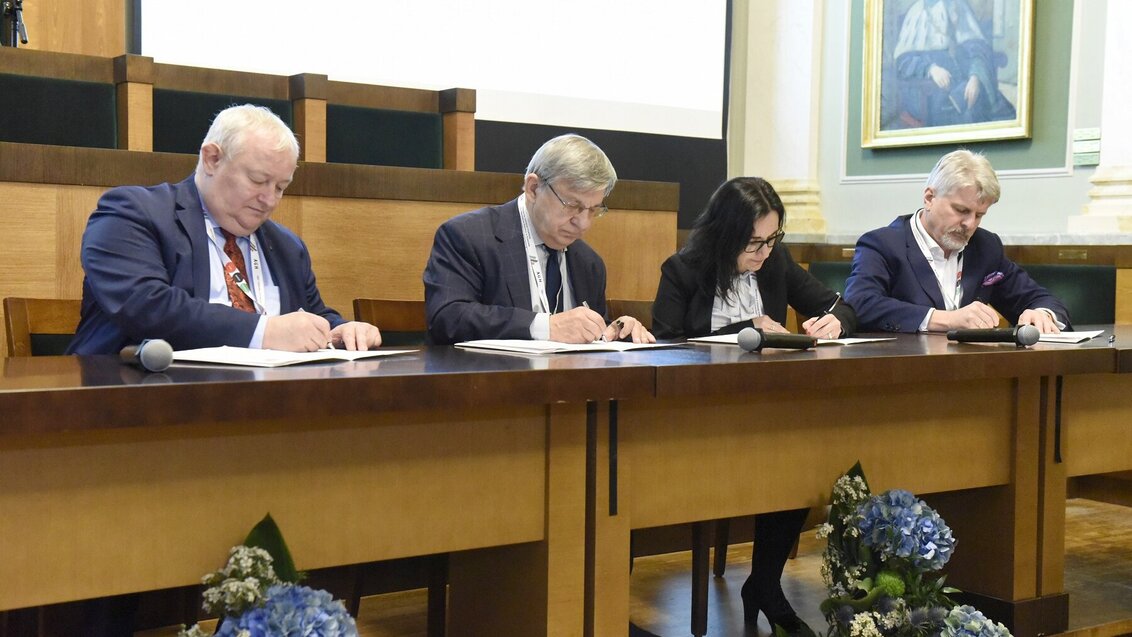
Photograph: Zbigniew Sulima
On 18 October 2024, the AGH University concluded an agreement on scientific and technical cooperation, establishing the Polish natural hydrogen initiative, Geo-Hydrogen. The main objective of the signatories to the agreement is joint work in the field of, among other things, scientific research, the typing of areas for the exploration of natural hydrogen deposits in Poland, and the development of technologies related to the potential exploitation of this raw material.
During the recent conference on natural hydrogen organised at the AGH University, which brought together experts and provided an opportunity to discuss the most important challenges related to the search for and implementation of hydrogen solutions, an agreement was signed setting out the directions for work on, among other things, scientific research, the search for natural hydrogen deposits in Poland, and the development of technologies related to their potential exploitation.
The main task of the initiative will be the implementation of scientific research and research and development projects, including the identification of natural processes leading to the formation of natural hydrogen accumulations, as well as the search for and access to hydrogen deposits in Poland. In addition, the initiative envisages activities aimed at developing technologies related to the potential exploitation of these resources, as well as defining economic conditions for their extraction. It is planned to organise traineeships for students, conferences, and joint research and popular science publications.
“The starting point for our joint initiative is hydrogen, which plays a key role for the future of industry, economy, and energy, representing not only an innovative energy source but also an opportunity to achieve sustainable development. In the context of a dynamically changing energy market, the development of hydrogen technology is essential to ensure energy stability and economic competitiveness. Therefore, it is particularly important to educate students in this field, future engineers and scientists who will be leaders of the energy transition,” explained Professor Jerzy Lis, AGH University Rector.
Wiesław Prugar, member of the ORLEN Management Board for Upstream, noted:
“The objective of ORLEN Group's hydrogen strategy is to strengthen the Company's position in the entire hydrogen value chain, from production, to distribution, to storage of renewable hydrogen, to its various industrial applications. The establishment of the initiative is an expression of our commitment to all aspects of the development of the domestic hydrogen market. The initiative is also part of the ORLEN Group's policy on cooperation with scientific communities, which we have been pursuing for many years. Together with outstanding Polish scientific and research centres, we want to expand our scientific and technical cooperation and implement its effects in business practice. We have been active in the field of exploration and production of hydrocarbons and other raw materials in Poland for several decades, so we have unique competences and a wealth of experience to take on new and demanding challenges. An added value of the initiative will be joint educational and popularisation activities related to the hydrogen management.”
As added by Professor Krzysztof Szamałek, Director of the Polish Geological Institute – National Research Institute:
“The search for hydrogen accumulation in the Earth's crust, i.e. geological or natural hydrogen deposits, is a challenge which the Polish Geological Institute - NRI, being the state geological service, has been undertaking for almost two years now. We are trying to determine which geological horizons, rock formations, are the most promising in terms of the occurrence of natural hydrogen in Poland and what are the chances of discovering and economically managing the deposits of this raw material. This issue is important not only from the point of view of the energy transformation of our country's economy, but natural hydrogen, its genesis, sources, and forms of occurrence, is also a source of fascination for the scientific world. This is a completely new direction for geological research, which, together with the signatories to the today’s agreement, we are going to develop as part of the Polish initiative for natural hydrogen. Perhaps we will soon be able to answer the most important question of the day: to what extent will hydrogen exploited in a similar way to natural gas cover domestic demand for this raw material?”
Dr Magdalena Wdowin, professor at and acting director of the Mineral and Energy Economy Research Institute of the Polish Academy of Sciences, quoted the motto White hydrogen – clean energy for a sustainable future, adding:
“Extracted naturally, this raw material has the potential to become one of the key energy sources supporting sustainable development and the fight against the climate crisis. In the face of the energy-climate transition, diversification of energy sources is essential, so the search for deposits of white hydrogen is a necessary and extremely important step. I am pleased that the Mineral and Energy Economy Research Institute of the Polish Academy of Sciences has the appropriate competencies to actively participate in this search. I believe that being part of such a prestigious consortium, thanks to our more than thirty years of experience in deposit documentation, economics, and geology, we can make a significant contribution to the development of knowledge and setting directions of activities that will enable the evaluation of natural energy resources and their diversification. This, in turn, will build prosumer confidence and ensure the country's energy security.”
The document was signed by the AGH University of Krakow, the Polish Geological Institute – National Research Institute, the Mineral and Energy Economy Research Institute of the Polish Academy of Sciences and ORLEN SA. On the part of the AGH University, the agreement will be implemented by the Department of Energy Resources of the Faculty of Geology, Geophysics, and Environmental Protection.
Photograph: Zbigniew Sulima

 AGH University Alumni Day 2024
AGH University Alumni Day 2024  Projects by AGH University Main Library with funding from Scientific Social Responsibility programme
Projects by AGH University Main Library with funding from Scientific Social Responsibility programme  Honouring those we lost this year
Honouring those we lost this year  On energy transformation and more. Distributed Energy Congress
On energy transformation and more. Distributed Energy Congress  Space Technology Centre in newly-established Polish Partnership for Earth Observation
Space Technology Centre in newly-established Polish Partnership for Earth Observation  AGH University to establish AI Factory
AGH University to establish AI Factory 

